Episodes
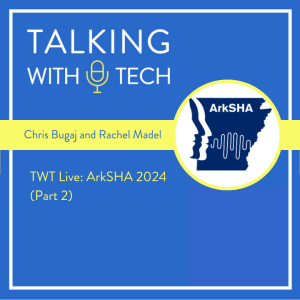
Friday Dec 13, 2024
Friday Dec 13, 2024
This week, we share Part 2 of Chris and Rachel’s TWT Live episode recorded at the 2024 Arkansas Speech and Hearing Association! In this half of the episode, they share about modeling, teaching AT tools, strategies to support language development, and more!
Before the interview, Rachel shares about her experience teaching her grandmother to use a screen reader to regain independence despite vision loss. They discuss the broader implications of teaching technology usage, advocate for integrating tools like the Pomodoro Technique into education, the need for accessible design, and more!
Key Ideas this Episode:
Overcoming Barriers to AAC Adoption: The hosts emphasized the importance of asking questions to uncover the reasons behind resistance or challenges in implementing Augmentative and Alternative Communication (AAC). This approach helps identify specific roadblocks and creates opportunities to educate and empower teachers, paraprofessionals, and parents.
The Role of Coaching and Modeling: The conversation highlighted the importance of hands-on coaching and modeling AAC use directly in classrooms. This strategy allows educators to learn by example and practice implementing AAC tools effectively, fostering better long-term adoption and skill development.
Inclusive Decision-Making and Customization: Engaging all stakeholders (teachers, parents, service providers, and students) in a structured decision-making process ensures that AAC tools and strategies are well-suited to the student’s needs. This collaborative approach builds ownership and buy-in, making implementation more successful and sustainable.
Visit talkingwithtech.org to listen to previous episodes, find new resources, and more!
Help us develop new content and keep the podcast going strong! Support our podcast at patreon.com/talkingwithtech!
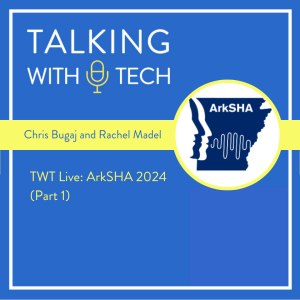
Monday Dec 09, 2024
Monday Dec 09, 2024
This week, we share Part 1 of Chris and Rachel’s TWT Live episode recorded at the 2024 Arkansas Speech and Hearing Association! The episode touches on several topics, including using AI to analyze language from Gestalt Language Processors, getting buy in from teachers, and more!
Before the interview, Chris and Rachel discuss the some of the controversy surrounding “revoicing,”which involves a communication partner restating or clarifying messages from an AAC user.
Key Ideas this Episode:
🔑 Revoicing as a Communication Tool: Chris and Rachel share why, from their perspective, revoicing, should be considered a legitimate component of a communication system when consented to and ratified by the AAC user. Rachel and Chris stress the importance of differentiating “revoicing” from controversial practices like facilitated communication, and call for structured guidelines to ensure ethical and effective practices in this area.
🔑 Generative AI as a Tool for Language Analysis: Chris and Rachel explored how tools like ChatGPT could assist in analyzing language development, including its potential to identify stages of Gestalt language processing. They noted the importance of educating AI tools for more accurate and insightful analysis.
🔑 Gaining Buy-In for AAC in Education: Strategies were discussed to encourage teachers to adopt AAC devices in classrooms, such as helping educators empathize with the challenges of nonverbal communication by asking if they have ever taught without their voice.
Visit talkingwithtech.org to listen to previous episodes, find new resources, and more!
Help us develop new content and keep the podcast going strong! Support our podcast at patreon.com/talkingwithtech!
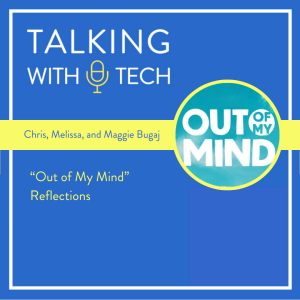
Saturday Nov 30, 2024
Saturday Nov 30, 2024
In this episode of Talking with Tech, Chris, Melissa, and Maggie Bugaj reflect on the Disney+ movie Out of My Mind! This film centers around a young AAC user with cerebral palsy, and has sparked a lot of conversations about AAC online. The Bugaj family talks about how we can take the popularity of this movie to continue and share the message of inclusive education and support for AAC!
1. Presuming Potential and Inclusive Education: The episode emphasizes the importance of assuming all students, including those with disabilities, have potential. Teachers, families, and educators are encouraged to provide opportunities for students with disabilities to thrive in general education settings, advocating for systemic change rather than blaming individual limitations.
2. The Role of Relationships and Communication Tools: Highlighting the significance of AAC, the Bugaj family discusses how multiple forms of AAC can enable effective communication. The relationships built between students, teachers, and parents are crucial for understanding individual needs and fostering inclusive environments.
3. Shifting Attitudes in Education: The movie serves as a call to action for educators to reflect on their practices and biases. It challenges educators to embrace training and resources to support inclusive education, an important concept as general education increasingly incorporates special education responsibilities. The movie illustrates that change begins with educators understanding and altering the environment, rather than trying to change the individual.
Links:
Watch Out of My MInd on Disney+
Supplemental Materials, Including Lesson Plans
Visit talkingwithtech.org to listen to previous episodes, find new resources, and more!
Help us develop new content and keep the podcast going strong! Support our podcast at patreon.com/talkingwithtech!
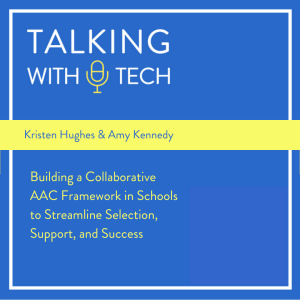
Wednesday Oct 30, 2024
Wednesday Oct 30, 2024
This week, we share Chris’s interview with Kristen Hughes and Amy Kennedy! Kristen and Amy both work for Baldwin County Public Schools; Kristen as a speech-language pathologist and Amy as a special education resource consultant. Kristen is also a parent of a six-year-old son who uses AAC. Kristen is transitioning into a new role as an AAC specialist within her school district, and she wanted to ask Chris more about the Specific Language System First approach, leveraging collaboration, refining selection processes, and supporting educators with resources and training.
Before the interview, Chris shares experiences from a recent classroom lesson that unexpectedly turned into a broader discussion about fostering AAC culture for a whole school!
Key ideas this week:
🔑 Collaborative Decision-Making for AAC Selection: Kristen and Amy, along with Chris, emphasize a structured, team-based approach to selecting AAC tools. Instead of relying solely on a single expert’s choice, they suggest involving a full team—including teachers, parents, and relevant therapists—to determine the best AAC solution for each student. This approach helps foster shared ownership of the decision, ensuring consistent implementation and increased buy-in from all parties.
🔑 Efficient AAC Implementation Process: The team explores the idea of moving away from lengthy “trial” periods in favor of setting up a solid decision-making framework that defines criteria for selecting AAC tools based on specific student needs. By doing this, they aim to streamline the AAC selection and implementation process, helping reduce delays and allowing students to start benefiting from the tools more quickly.
🔑 Increased Support and Training for Educators: Recognizing time and comfort with AAC as barriers, they discuss the importance of training and support for teachers. Implementing consistent resources, like core boards and training on specific AAC tools, would empower teachers to integrate these tools more naturally in the classroom, reducing abandonment and ensuring AAC devices are used effectively.
Visit talkingwithtech.org to listen to previous episodes, find new resources, and more!
Help us develop new content and keep the podcast going strong! Support our podcast at patreon.com/talkingwithtech!
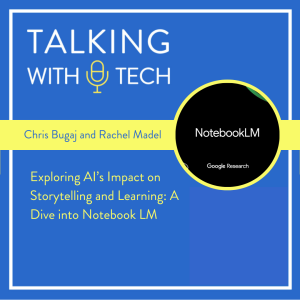
Wednesday Oct 23, 2024
Wednesday Oct 23, 2024
This week, Chris and Rachel share about NotebookLM.google.com, an AI website that will do things like create an actual “podcast episode” about an uploaded document or webpage! Chris and Rachel share some of the things they have created with this tool and ideas about how to quickly create engaging materials for your students.
Key Ideas this Week:
🔑 AI-generated content for educational purposes: Chris and Rachel explore the use of AI to generate podcasts and conversational content based on text inputs through the website NotebookLM.google.com. They discuss the potential of using this technology to make learning materials more engaging for students, like listening to two hosts discuss educational content with emotion instead of just reading.
🔑 Impact of storytelling in learning: Rachel emphasizes the importance of storytelling in helping people engage with and retain information. She highlights how AI-generated discussions can create narratives that make dry or complex content more accessible and memorable.
🔑 Potential and concerns of AI in professional and personal contexts: While the technology is praised for its ability to save time and increase productivity (e.g., turning a slide deck into a podcast), both hosts also express concerns about the ethical implications, such as deepfakes and the possibility of AI being used maliciously. AI’s potential for both positive and negative impact is a recurring theme throughout the conversation.
Links from this Week’s Episode:
NotebookLM.google.com
ifaketextmessage.com
Visit talkingwithtech.org to listen to previous episodes, find new resources, and more!
Help us develop new content and keep the podcast going strong! Support our podcast at patreon.com/talkingwithtech!
.

Wednesday Oct 09, 2024
Wednesday Oct 09, 2024
This week, we share Rachel’s interview with Anand (@anandmurthy) and Amanda Murthy (@amandajanemurthy)! Anand and Amanda’s son, Maverick, is affected by infantile spasms, a rare form of epilepsy. Maverick has undergone multiple brain surgeries and faced numerous challenges related to his condition. Anand and Amanda share about their journey to raise awareness about infantile spasms, the importance of collaboration among healthcare providers, the need for comprehensive support systems for families of children with complex medical needs, and more!
Key Ideas this Week:
The Complexity of Infantile Spasms Anand and Amanda share the difficulty in diagnosing and treating their son Maverick's condition, infantile spasms, a rare form of epilepsy. They discuss the challenges of working with a medical system that often lacks awareness of infantile spasms and the need for immediate intervention, such as EEGs, to properly diagnose and manage it.
The Importance of Advocacy and Persistence: The Murthys emphasize the importance of advocating for their child in the medical system, navigating insurance challenges, and ensuring Maverick receives appropriate care. They discuss how parents need to be assertive with insurance companies and sometimes even with medical professionals to secure necessary treatments.
Collaboration in Therapy and AAC: The interview highlighted the significance of a multidisciplinary approach to Maverick’s therapy, including speech, occupational, and physical therapy, as well as ABA for autism. They also touched on the challenges of using Augmentative and Alternative Communication (AAC) for a child with complex needs and the importance of having a cohesive and collaborative team to support his progress.
Visit talkingwithtech.org to listen to previous episodes, find new resources, and more!
Help us develop new content and keep the podcast going strong! Support our podcast at patreon.com/talkingwithtech!
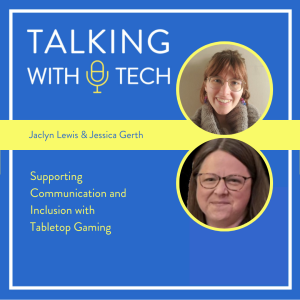
Wednesday Sep 25, 2024
Wednesday Sep 25, 2024
Jessica Gerth and Jaclyn Lewis
This week, we share Chris’s interview with Jessica Gerth and Jaclyn Lewis! Jessica (@chaoscommunicationconverse) is a speech pathologist who utilizes TTRPGs to enhance communication and social skills among her students. Jaclyn (@wranglerofchaos) is a writer, youth worker, and game master who wrote "Rolling with the Youth," a book focusing on fostering safe and fun spaces through role-playing games. Together, they emphasize the importance of inclusivity in gaming, aiming to provide all children, regardless of their backgrounds or abilities, a place at the table!
Before the interview, Chris and Rachel discuss their shared sense of optimism for the future of AAC, and some of the possible sources for their positive outlook. They connect this optimism with the concept presuming potential, which requires an unwavering belief that students have the potential to grow and make progress!
Key ideas this week:
The Power of Role-Playing Games (RPGs) in Education and Therapy: Jessica and Jaclyn emphasize how tabletop role-playing games, like Dungeons & Dragons, can be used for educational and therapeutic purposes. These games provide opportunities for language development, social skills practice, and creativity. Jessica shares how she incorporates elements of these games into her work with students, particularly those on the autism spectrum, helping them with communication and engagement.
Inclusivity in RPGs: The interview highlights the importance of creating inclusive spaces in role-playing games. Jaclyn discusses her work on making RPGs accessible to everyone, particularly younger players and those from diverse backgrounds. She and Jessica both emphasize the role of representation, where characters like Yumi, who uses an AAC device, offer both visibility and understanding of different abilities within the game.
Safe and Supportive Game Environments: Jessica and Jaclyn explore how to create a safe environment for players through tools like "Session Zero," where expectations are set, and safety tools like the X-card, which allow players to signal discomfort. This ensures that games are not only fun but also emotionally and socially supportive for players of all backgrounds and abilities.
Links from this Episode:
“Rolling with the Youth” by Jaclyn Lewis: https://www.indiepressrevolution.com/xcart/Rolling-with-the-Youth.html
Visit talkingwithtech.org to listen to previous episodes, find new resources, and more!
Help us develop new content and keep the podcast going strong! Support our podcast at patreon.com/talkingwithtech!
.
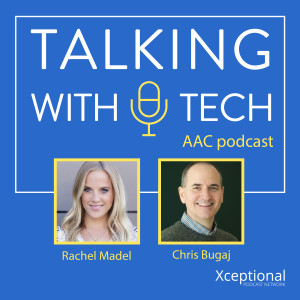
Thursday Sep 19, 2024
Thursday Sep 19, 2024
This week, we share Rachel’s interview with Amanda Diekman! Amanda (@lowdemandamanda)is an autistic adult and parent of three neurodivergent children who advocates for a shift away from traditional parenting models that prioritize control and demands. She suggests that accommodating children's needs and reducing expectations can foster better emotional connections. The interview underscores the significance of empathy, patience, and the need for adults to reflect on their own emotional responses to better support children in navigating their challenges!
Before the interview, Rachel and Chris discuss some recent work that Rachel is doing on a yet-to-be-released update of her course, AAC Ally! Rachel shares that, since the previous version of AAC Ally focused more on assessment, the new version of AAC Ally will focus more on implementation and treatment. Rachel suggests that you sign up for her newsletter at rachelmadel.com/optin to receive updates on when the updated AAC Ally releases!
Key Ideas this Episode:
Radical Acceptance and Safety: Amanda emphasizes the importance of creating a sense of safety in children by aligning expectations with their capabilities. This involves understanding and accepting children as they are, without imposing overwhelming demands that trigger stress and make them feel unsafe.
Non-Verbal Communication and Co-Regulation: Amanda explains that much of the communication with children, especially neurodivergent ones, can be non-verbal. Parents and caregivers should rely on their own nervous systems to co-regulate, recognizing distress signals and providing calm and connection to bring children back to a state of safety.
Letting Go of Control: A major aspect of low-demand parenting is learning to release control and lower demands when children are overwhelmed. Rather than doubling down on rules or consequences, Amanda advocates for letting go of unrealistic expectations in the moment to restore emotional safety and connection.
Visit talkingwithtech.org to listen to previous episodes, find new resources, and more!
Help us develop new content and keep the podcast going strong! Support our podcast at patreon.com/talkingwithtech!

Wednesday Sep 11, 2024
Wednesday Sep 11, 2024
This week, we interview Brianna Hughes and Tiffany Rezvani! Brianna and Tiffany are Speech-Language Pathologists and AAC Specialists based in Northern California. They share all about the free AAC screening tool they created, called AAC Screening, that helps educators and clinicians efficiently identify students who may benefit from AAC devices!
Before the interview, Chris shares some exciting news about going to Communication Matters in the UK this year! Chris will try and gather recordings while he is at the conference to share on a future podcast!
Key Ideas this Week:
Development of an AAC Screening Tool: Brianna and Tiffany created an AAC screening tool designed to streamline the assessment process for students in moderate and moderate-severe self-contained classrooms, particularly focusing on younger students (pre-K to kindergarten). This tool helps identify students who need AAC support more efficiently, allowing professionals to allocate more time to implementation rather than lengthy assessments.
Benefits of Screening and Implementation: The AAC screening tool has reduced the stress on staff by ensuring that students are identified early, speeding up the provision of AAC devices, and freeing up time for training and support. This approach aligns with the specific language system first model, emphasizing quicker access to AAC and increased focus on real-world application and modeling rather than exhaustive device trials.
Building a Supportive AAC Culture: By screening entire classrooms and often standardizing the systems used within them, the tool has helped foster a more confident and capable environment among teachers and staff. This approach has integrated AAC into daily routines and academic curricula, leading to improved communication and literacy outcomes for students, which benefits everyone involved in the education process.
Links from This Episode:
AAC Screening Tool: aacscreen ing.com
Visit talkingwithtech.org to listen to previous episodes, find new resources, and more!
Help us develop new content and keep the podcast going strong! Support our podcast at patreon.com/talkingwithtech!

Wednesday Sep 04, 2024
Wednesday Sep 04, 2024
This week, Chris interviews Marnina Allis and Marisa Portanova, two speech-language pathologists at Blythedale Children’s Hospital, the only independent specialty children’s hospital in New York State! Marnina and Marisa share about their role on the core assistive technology (AT) team, ideas for supporting AAC users and their families outside the hospital, taking a team-based approach to treatment, and more!
Before the interview, Chris and Rachel share about starting the school year and how changing school teams often bring a certain amount of new energy to school sites. Chris also shares about one of his favorite things to start the school year - donning the costume of Shadow the Dog, the mascot for his wife’s elementary school!
Key Ideas This Week:
1. Collaborative Approach to AT and AAC: Marnina and Marisa emphasize the importance of a collaborative approach at Blythedale Children’s Hospital, involving a core AT team that includes speech therapists, occupational therapists, physical therapists, and a rehab engineer. This team works together to provide comprehensive support to pediatric patients with complex needs, ensuring that assistive technology solutions are tailored to individual requirements and are integrated into the patients' everyday lives.
2. Focus on Family and Community Involvement: The interview highlights the hospital's commitment to involving families in the therapy process, empowering them to feel comfortable and capable of using assistive technology with their children. They aim to provide ongoing education and support to families, recognizing that successful communication strategies need to be practiced in all environments, including home and school.
3. Make Learning Language Fun: Marnina and Marisa discuss their implementation of group therapy sessions that focus on fun, engaging activities like games and themed literacy projects, which allow children to interact socially while working on communication goals. This creates a supportive, interactive environment that promotes skill development and community building among AAC users.
Links From This Episode:
TED Talk - Derek Shivers: How To Start a Movement
Visit talkingwithtech.org to listen to previous episodes, find new resources, and more!
Help us develop new content and keep the podcast going strong! Support our podcast at patreon.com/talkingwithtech!
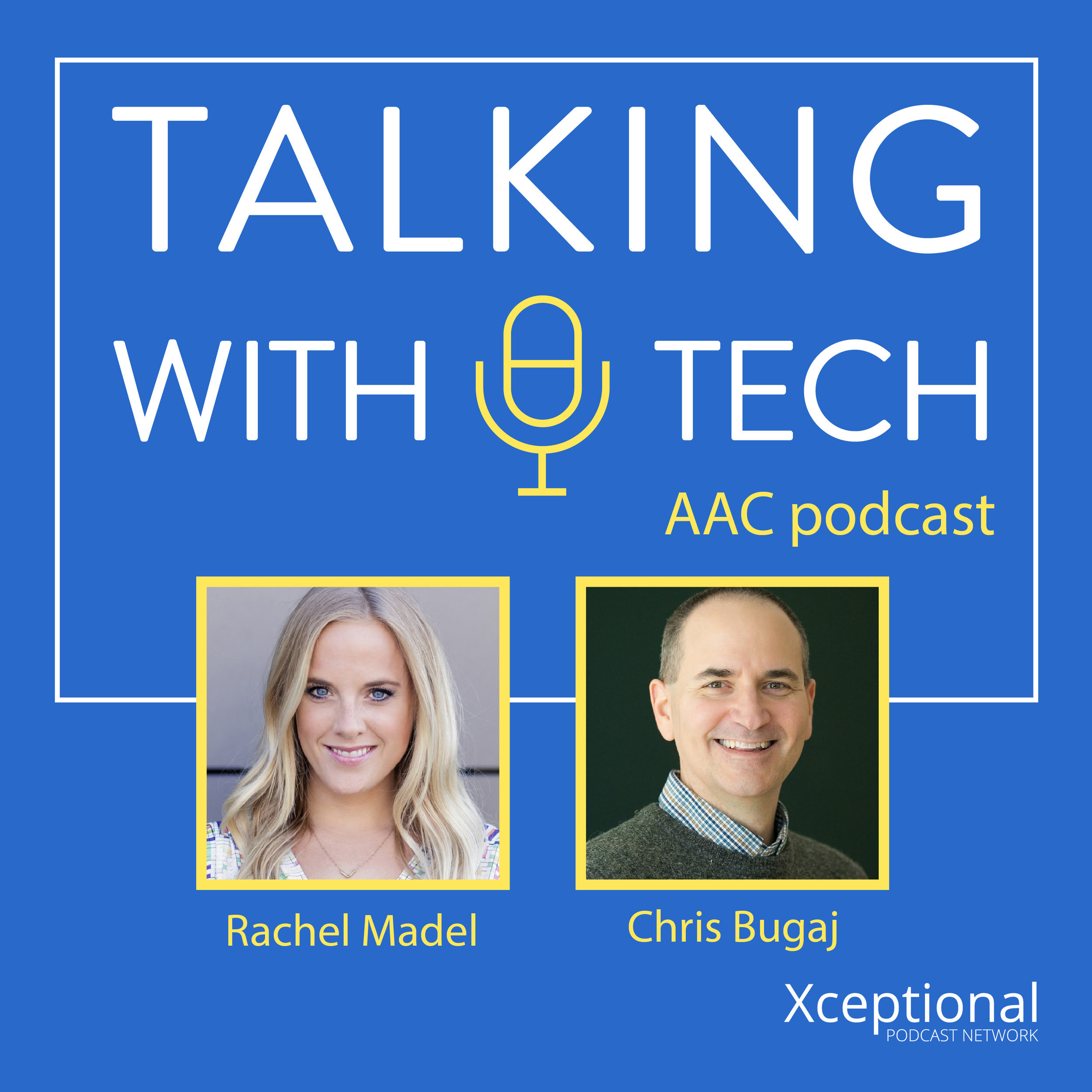
Join AAC experts Rachel Madel and Chris Bugaj as they dive into a weekly discussion about all things AAC (Augmentative and Alternative Communication). Every episode they deliver practical resources, clinical guidelines and relevant research to help clinicians better utilize technology for individuals with complex communication needs.
Episodes include interviews with industry thought-leaders, clinicians, parents, researchers and app developers to keep you on the pulse of the educational technology scene and better support communication through the use of technology.


